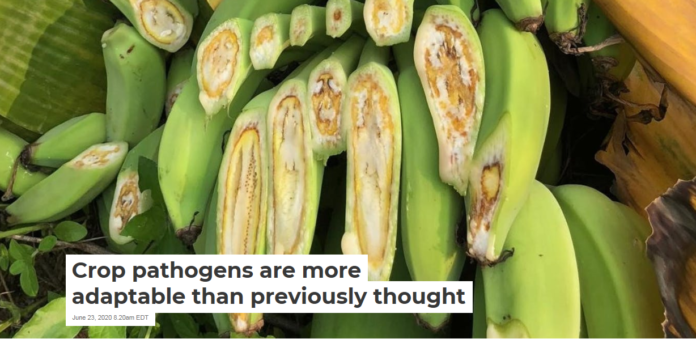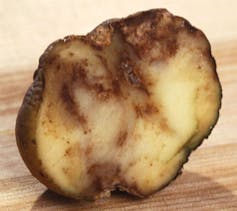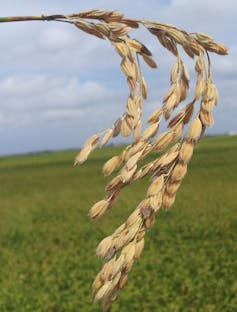

Antonis Rokas, Vanderbilt University
The Research Brief is a short take about interesting academic work.
The big idea
Many of the pathogens threatening the world’s major crops and food security are either fungi or fungus-like organisms known as oomycetes. In a recent study published in the journal Nature Communications, researchers found that these microorganisms have the ability to rapidly adapt to environmental conditions and to the plant hosts they infect. This finding adds to growing concerns around these types of pathogens, which could become harder to control in both agriculture and forestry.

Wikipedia
To understand why only certain organisms are pathogens and others are not, ecologists like to think of each organism’s lifestyle or “ecological niche.” An organism’s niche is a space defined by its relationship to other organisms, such as the host organisms it interacts with, and preferred environmental conditions, such as temperature and humidity. For example, the oomycete Phytophthora infestans that causes potato late blight thrives at lower temperatures, around 15 degrees Celsius, whereas Botryosphaeria fungi causing apple “bot rots” prefer temperatures around or above 25°C.
While the ecological niches of many plant and animal pathogens are well understood, this is not the case for microbial pathogens, such as fungi and oomycetes. To begin filling this gap, the new study synthesized and analyzed temperature and host plant range data from hundreds of fungal and oomycete pathogens.
The researchers found that although some pathogens infect just one or a few plant hosts, others infect a broad range. The same was true of temperature; some pathogens can grow in a broad range of temperatures, while others thrive in only a narrow range. Simply put, there’s not one pathogen lifestyle; rather, any lifestyle could be that of a pathogen.
But an even bigger surprise came when the researchers discovered that the two traits, temperature range and plant host range, did not correlate with one another. Thus, crop pathogen lifestyles cannot easily be grouped into general categories, such as generalists that grow in a wide range of temperatures and infect many plant hosts, and specialists, which is the opposite. What’s more, the new study found that both temperature range and plant host range change rapidly during evolution.
Why it matters

Wikipedia, CC BY-SA
Knowledge that crop pathogens exhibit diverse ecological lifestyles and evolve rapidly is decidedly not good news for our crops and global food security. On a planet where the climate is changing, highly adaptable pathogens are likely to be harder to control. In addition, much of the world relies on an outdated system of agriculture that favors monoculture and reliance on fungicides to which pathogens quickly evolve resistance. This combination make for a deadly mix, with new outbreaks of emerging plant diseases on the rise.
What still isn’t known
We still know little about the ecological niches of microbes. Examining host range and temperature, two important traits to the lifestyles of crop pathogens, is but the first step. In the future, researchers will need to examine additional facets of the ecological niches of these pathogens, such as humidity or competition with other organisms, which will be key for understanding why some microbes are pathogens and others are innocuous.
[Like what you’ve read? Want more? Sign up for The Conversation’s daily newsletter.]![]()
Antonis Rokas, Cornelius Vanderbilt Chair in Biological Sciences, Professor of Biological Sciences and Biomedical Informatics, and Director of the Vanderbilt Evolutionary Studies Initiative, Vanderbilt University
This article is republished from The Conversation under a Creative Commons license. Read the original article.



















